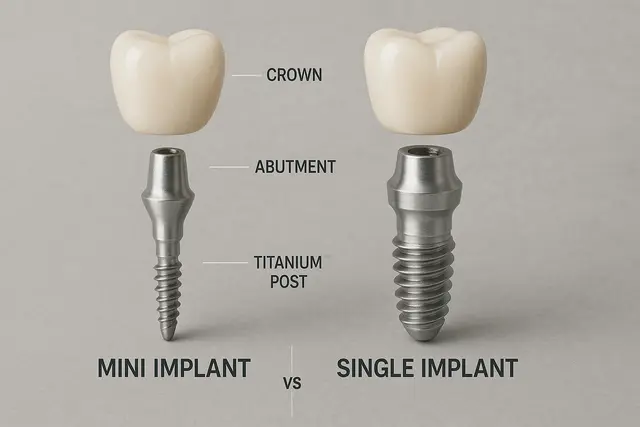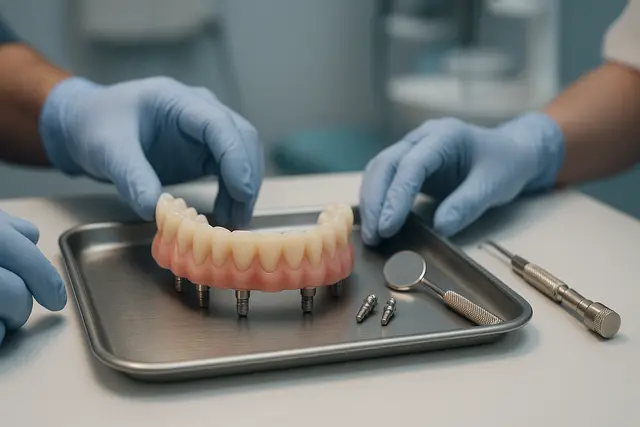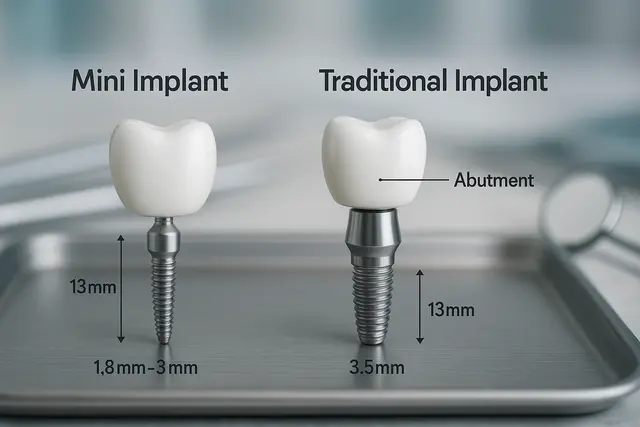Prosthodontics
5 min read
Mar 28, 2025
Smoking and Dental Implants: Risks and Success Rates
You’ve got missing teeth, and you're thinking about getting dental implants. Maybe you’ve been putting it off. Maybe you’ve even convinced yourself your morning cigarette won’t matter. But here’s the thing, it does matter. If you’re a smoker and planning to get dental implants, this is the conversation no one’s had with you yet, but absolutely should.

So... Can You Smoke and Still Get Dental Implants?
Short answer: yes, technically. But should you light up before or after implant placement? That’s where things get tricky.
When you’re receiving dental implants, what you need more than anything is healing. The implant needs time to fuse with your jawbone (a process called osseointegration), and your gums need to stay healthy. Smoking at least a few times a day during this process? That’s like trying to glue something while blowing dust into the cracks.
It’s not just the smoke, it’s the effect of smoking on blood vessels, your immune system, and your ability to recover. Bottom line: smoking increases the risk of implant failure by a lot.
What’s Actually Happening Inside Your Mouth
Here’s what most people don’t realize: your mouth is a healing machine. It’s designed to repair itself constantly, tiny cuts, bacteria invasions, all of it. But when you smoke, you cut off oxygen. You mess with circulation. That means the area around the implant can’t rebuild properly, leaving you open to infection, inflammation, and ultimately, implant loss.
The effect of cigarette smoking goes deeper than just yellow teeth and bad breath. It compromises every part of your oral health. When it comes to dental implants, that’s a problem you can’t ignore.
Smoking and Dental Implants: A Risky Relationship
Let’s get specific. According to years of dental research and a widely cited systematic review and meta-analysis, the implant failure rate is higher among smokers than non-smokers. Sometimes double. Sometimes more.
And here’s the wild part, smoking even a few times a day can increase the risk of implant failure. The more cigarettes you smoke and the longer you’ve been doing it? The steeper the climb. Implants fail more often in people with heavier or longer smoking habits. That’s the cold, hard data.
Why the Timing Matters (A Lot)
One of the biggest mistakes? Smoking right after dental implant surgery. Your mouth is wide open, vulnerable, and your immune system is trying to work overtime. Cigarette smoke floods the area, delays healing, and opens the door to complications, sometimes ones you can’t come back from.
If you want the success of your dental implants to even have a chance, stop smoking for several weeks before and after surgery. That window is critical. Some implant dentists won’t even do the procedure unless you commit to quitting during that period. Can you blame them?
What About Long-Term Success?
Here’s where it gets more frustrating. Let’s say you manage to get through the surgery and early healing, awesome. But if you go right back to smoking, that implant is still living in a hostile environment. Over time, the bone around the implant weakens. The gums shrink. Infections creep in. And then? That tooth you thought was finally permanent could be gone.
That’s why the failure of dental implants isn’t just about the day of surgery, it’s about your lifestyle after. Smokers compared to non-smokers have higher failure rates even years down the line.
How Smoking Affects the Success of Dental Implants
You may be wondering: “So what’s the actual risk here?” According to studies in implant dentistry, the failure rate can be two to three times higher among smokers. That’s not an opinion, it’s the math. And it’s not just failure during the first few months. The impact of smoking affects long-term implant survival.
Even the best dental professionals can’t change biology. If you're smoking, especially without any breaks during treatment, the risk of dental implant failure increases across the board.
What’s a Smoker Supposed to Do Then?
You’ve got two choices. One: accept the higher risk and hope you beat the odds. Two: change your smoking habits, even temporarily, to improve your chances. If you go with the second option (and we hope you do), that means quitting smoking at least two weeks before surgery and staying smoke-free for several weeks after.
It’s not just about following orders, it’s about giving your body the space to do what it does best: heal. Even reducing the number of cigarettes you smoke daily can help if quitting completely feels too far out of reach.
Smoking Can Impact More Than Just the Implant
People often think of a failed implant as just a wasted investment. But it can snowball. Infection and implant failure can lead to bone loss, gum disease, and worse. Once that foundation is gone, it’s not just harder to replace the implant, it’s harder to treat anything.
If you want a lasting smile, oral health has to be your top priority. And that includes rethinking how smoking fits into your life.
Still Considering Dental Implants? Here’s What to Know
Implant treatment isn’t off-limits to smokers, it just comes with a higher price tag in terms of risk. The relationship between smoking and implant success is crystal clear. Smoking contributes to early implant failure, higher infection rates, and lower long-term success.
So if you're considering dental implants, talk honestly with your dentist. They might still move forward with the procedure, but they’ll likely recommend a plan that includes smoking cessation or at least reduction. This isn’t judgment, it’s strategy.
What the Research Actually Shows
A quick peek at the data: one study published in Int J Oral Maxillofac Implants found the rate of implant failure in smokers was significantly higher than in non-smokers. The combination of smoking and poor oral hygiene? Even worse. And implants placed in people who smoked heavily had some of the poorest outcomes across the board.
If you want the success of your dental implants to match what you see on glossy brochures, lifestyle changes are part of the deal.
Practical Tips to Lower Your Risk
Stop smoking for several weeks before and after dental implant placement.
Brush and floss religiously. Not just sometimes, every day.
Go to regular dental checkups. Even if everything seems fine.
Tell your dentist everything. The number of cigarettes smoked, duration of smoking, every detail helps them help you.
Avoid smoking after dental implant surgery at all costs. Even just for a few weeks. It matters more than you think.
Can You Get Dental Implants If You Smoke?
Yes, smokers can get dental implants, but the risks are significantly higher. Smoking reduces blood flow, impairs healing, and increases the chances of implant failure both short- and long-term. Dentists often recommend quitting or pausing smoking around surgery to improve success.
Why Is Smoking Bad for Dental Implants?
Smoking interferes with healing by restricting oxygen and blood flow to the gums and jawbone. This slows down osseointegration, the process where the implant fuses with bone, and increases the risk of infection, gum shrinkage, and long-term implant failure.
How Long Should You Avoid Smoking Before and After Implant Surgery?
It’s recommended to stop smoking at least two weeks before implant surgery and remain smoke-free for several weeks after. This critical healing window gives the implant the best chance to integrate successfully and lowers the risk of early complications.
What If You Can’t Quit Smoking Completely?
If quitting entirely isn’t realistic, even reducing how much you smoke can help. The fewer cigarettes you smoke before and after surgery, the better your body can heal. Be honest with your dentist so they can plan appropriately and support your oral health goals.
Read Next
Related Posts

Prosthodontics
Single Implant vs. Mini Implant: Key Differences, What Sets Them Apart
Missing teeth can impact everything from your confidence to your ability to eat comfortably. Thankfully, dental implants offer effective solutions, but not all implants are the same. Understanding the difference between a single implant and a mini implant can help you make the right choice for your needs.
5 min read
Oct 22, 2025

Prosthodontics
Permanent Fixed Implant Dentures Overview: Best Solution for Full-Mouth Restoration
Gone are the days when dentures meant bulky, uncomfortable teeth soaking in a bedside glass. Modern dentistry has completely transformed the way we approach tooth replacement, offering solutions that are more natural-looking, stable, and long-lasting than ever before.
5 min read
Oct 22, 2025

Prosthodontics
Mini Implants vs. Traditional Implants: How They Work and When to Choose Each
Missing teeth can impact more than just your appearance, they can affect your confidence, oral health, and ability to enjoy everyday activities like eating and speaking. Fortunately, dental implants offer a reliable solution. But when it comes to choosing between mini implants and traditional implants, the differences can be surprisingly significant.
5 min read
Oct 21, 2025
Don’t have time to research every dentist around you?
See why 30k+ patients trusted us